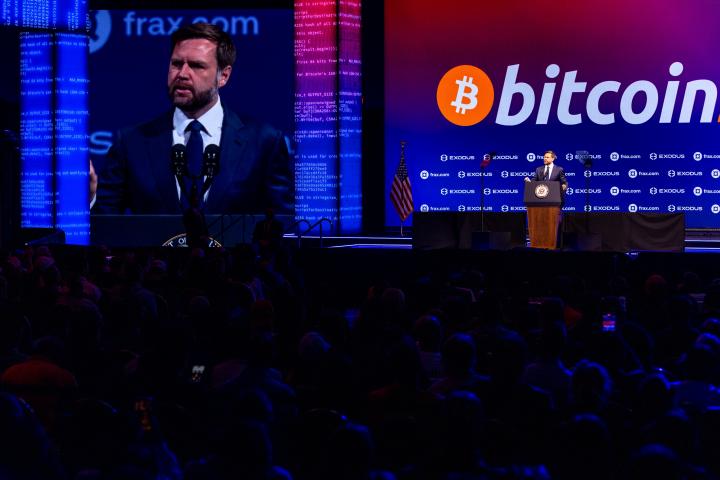
The US government is preparing a shock therapy approach that amounts to a controlled demolition of the current system. The goal is to turn the United States into the global hub for digital currencies.
This week, dubbed “Crypto Week” by House Republicans, is centered around the review of several legislative proposals aimed at radically transforming the United States into a digital-first economy. According to Arkansas Representative French Hill, the three bills are designed to safeguard America’s leading role in global innovation.
Legislation boosts crypto
The so-called Genius Act, which focuses on the regulation of stablecoins, has already passed the Senate. The Digital Asset Market Clarity Act, which is currently under review, outlines how cryptocurrencies should be regulated and defines the role of regulatory bodies such as the SEC with regard to digital tokens. Finally, the Anti-CBDC Surveillance State Act is up for debate. This bill would prohibit the Federal Reserve from launching its own digital currency.

All-time high cryptocurrency, july 2025
French Hill, who also chairs the House Financial Services Committee, said that lawmakers “want to take historic steps to free this fast-growing sector from the restrictions imposed by President Biden during the 2020–2024 period.”
Crypto investors clearly recognize the significance of these developments. Last week alone, they poured in as much as 2.7 billion dollar, pushing the price of major cryptocurrencies to an all-time high.
This surge is understandable. If the new financial architecture of the US economy is built on blockchain-style ledgers—with smart contracts and digital-first design—it would represent a fundamental shift. Traditional legal accounting systems would be replaced by real-time transaction logs, improving both transparency and control.
One insider familiar with what’s happening behind closed doors in Washington described the initiative as a controlled demolition and as a reckoning with those who benefited most from the aftermath of the Global Financial Crisis of 2008–2009.
These firms, predominantly in the financial sector, rewarded themselves handsomely after the crisis—even though they had taken on such excessive risks that they jeopardized not only their own survival but also that of American households and the system as a whole. Not a single bank CEO ended up in prison.
More importantly, the extended fallout of the crisis led banks to take new risks that contributed to sharply rising prices for consumers. This severely damaged the social contract between the state and its citizens, according to geopolitical analyst and strategist Pippa Malmgren on Substack.
‘It’s Robin Hood time’
Influential scholar Noam Chomsky wrote after the 2008 crisis that capitalism had become “socialism for the rich and capitalism for the poor.” That sentiment fueled prolonged protests in New York—Main Street versus Wall Street. As protestors put it at the time: “We borrowed from the future to cover the losses.”
So it’s high time for a recalibration, argues analyst Malmgren. In the past, policymakers ensured a balance between savers and investors (“speculators”), but under Presidents Obama and Biden, they increasingly catered to speculators. Malmgren writes: “Trump and his team see themselves as the caped crusaders that are going to rescue America from these voracious oligarchs who don’t care about the price of eggs and who will never share their wealth with anybody. Their supporters agree. It’s Robin Hood time.”
Against that backdrop, Malmgren views the so-called controlled demolition of the American financial system as inevitable. A radical digital transformation is unavoidable. It will likely trigger a crisis of trust and a collapse of existing institutions, including governments and banks. This resonates particularly with younger generations, who—as surveys suggest—favor decentralized finance (DeFi), cryptocurrencies, and tech-driven financial solutions. This shift could result in the following timeline:

Table created using ChatGPT based on prompts.
Back in 2022, Pippa Malmgren already warned at the World Government Summit in Dubai: “We are on the brink of a dramatic change… We will abandon the traditional system of money and introduce blockchain and will come to an almost perfect record of every single transaction.”
Trump family embraces crypto
Interestingly, during his first term (2016–2020), President Trump was highly skeptical of cryptocurrencies. That changed as the 2024 presidential elections approached. He embraced digital assets, and after his victory, his family invested heavily. Estimates suggest that their paper gains now exceed 2 billion dollar.
Trump’s embrace of cryptocurrencies has been widely welcomed by the crypto community. Vice President JD Vance, for instance, was met with great enthusiasm when he appeared at the recent Bitcoin conference in Las Vegas.
This article was written by Cees van Lotringen and was originally published on opzoeknaarhetnieuweverhaal.nl.